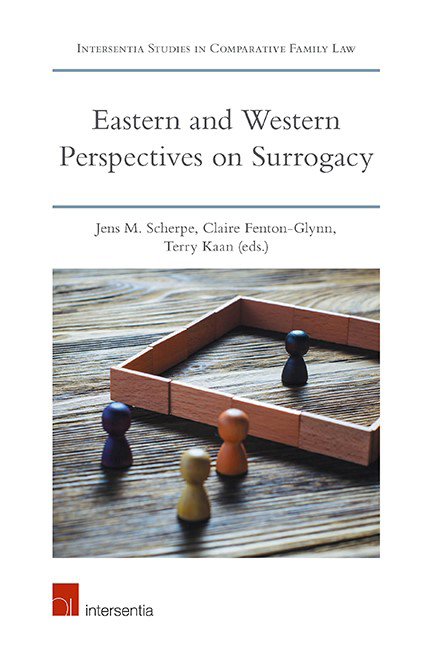Book contents
- Frontmatter
- Preface and Acknowledgements
- Contents
- List of Contributors
- Introduction
- Questionnaire
- PART I WESTERN PERSPECTIVES
- THE PROHIBITIVE APPROACH
- THE TOLERANT APPROACH
- Australia
- Australia: A Judicial Perspective
- England and Wales
- England and Wales: A Judicial Perspective
- THE REGULATORY APPROACH
- THE FREE MARKET APPROACH
- THE INFLUENCE OF INTERNATIONAL COURTS
- PART II EASTERN PERSPECTIVES
- THE PROHIBITIVE APPROACH
- A TOLERANT APPROACH?
- REGULATION THROUGH PROFESSIONAL MEDICAL BODIES
- FROM FREE MARKET TO REGULATION
- PART III COMPARATIVE PERSPECTIVES ON SURROGACY
- Index
- About the Editors
England and Wales: A Judicial Perspective
from THE TOLERANT APPROACH
Published online by Cambridge University Press: 26 June 2019
- Frontmatter
- Preface and Acknowledgements
- Contents
- List of Contributors
- Introduction
- Questionnaire
- PART I WESTERN PERSPECTIVES
- THE PROHIBITIVE APPROACH
- THE TOLERANT APPROACH
- Australia
- Australia: A Judicial Perspective
- England and Wales
- England and Wales: A Judicial Perspective
- THE REGULATORY APPROACH
- THE FREE MARKET APPROACH
- THE INFLUENCE OF INTERNATIONAL COURTS
- PART II EASTERN PERSPECTIVES
- THE PROHIBITIVE APPROACH
- A TOLERANT APPROACH?
- REGULATION THROUGH PROFESSIONAL MEDICAL BODIES
- FROM FREE MARKET TO REGULATION
- PART III COMPARATIVE PERSPECTIVES ON SURROGACY
- Index
- About the Editors
Summary
Any rational consideration of surrogacy is bound to be inadequate. The desire to parent has a deep emotional, not to say emotive, component and lawyers and legislators ignore that at their peril. Rationality, however, remains necessary, for the closing words of the Book of Judges in the Hebrew Scriptures – ‘In those days Israel had no King and every man did what was right in his own eyes’ – describe not utopia but anarchy. What is required is a judicious blend of rationality and human empathy.
This becomes the more so where the subject matter of our consideration is both complex and morally controversial as well as emotive. It means that every judgment is value-laden and not only may those values be controversial, there will be more than one value system in play at any one time. So we will have to take into account the values of the society in which we are engaged as well as the values of the particular parties involved. Moreover, we have to recognise that in any value-laden discretionary decision, account must also be taken of the values of the individual trial judge. I suspect that, even amongst the small group of judges in England and Wales who do this work, there will be a wide range of personal values. Were you to read any judgment of mine, you may or may not be able to detect my own value system but it will nevertheless have played a part in any discretionary decision. It will be clear then that these different value systems may not all pull in the same direction. It should not therefore surprise us if we encounter difficulties in this area of law.
The usual (but not the only) expression of surrogacy is the fertilisation of a donated egg, using the sperm of a commissioning parent, which is then implanted in the surrogate who gives birth in due course. The requirement in English law is provided as follows:
‘… (a) the child has been carried by a woman who is not one of the applicants as a result of the placing in her of an embryo or sperm and eggs or her artificial insemination,
(b) the gametes of at least one of the applicants were used to bring about the creation of the embryo …’
- Type
- Chapter
- Information
- Eastern and Western Perspectives on Surrogacy , pp. 135 - 144Publisher: IntersentiaPrint publication year: 2019

